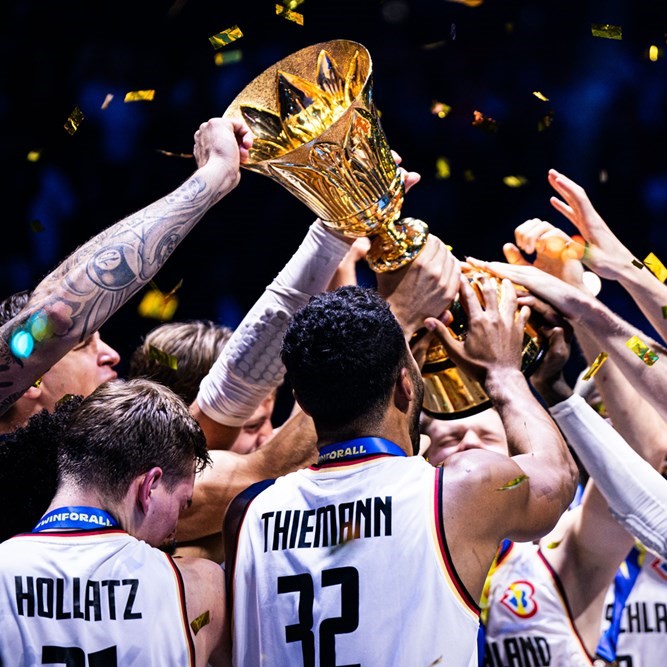
The 2023 FIBA Basketball World Cup has been and gone. The Olympics are next year followed by EuroBasket, AfroBasket, and the FIBA Asia Cup in 2025. As things stand, the hierarchy of international basketball is set. Emmet Ryan wants to change that a lot, the route is through changing eligibility for FIBA basketball
International basketball has, for a long time, been the USA followed by everyone else. Even allowing for the successes of Germany and Spain at the last two men’s editions of the FIBA Basketball World Cup, the disparity is obvious but it goes deeper.
FIBA has always been focused, squarely and without question, on developing the sport in as many places as possible around the world. FIBA’s approach however has been one that has been decried as somehow being both too conservative and too liberal at times. In truth, it is both.
The current state of play
To play international basketball for any nation right now, there are two routes. Either get a passport for that nation before you turn 16 or be the lone naturalised player that is given a passport.
This latter option is used to wildly different degrees and effects by nations around the world. The naturalised player does not require any ties, through blood or residency, to the nation they play for. There can also be only one such player.
This is very different to all kinds of sports, most of which allow some form of ancestry or naturalisation rules. They also aim, in general, to be more uniform in application. Naturalisation in FIBA basketball varies wildly in application. Some nations will turn matters around in a matter of days. Others may demand some form of blood tie to even consider it.
The proposal
It is really quite simple, copying the model of the biggest sport and governing body on the planet. FIFA allows anyone with either a parent or grandparent from a nation to play for that nation. Furthermore, there is a uniform approach to residency. A player must have resided in the country they wish to play with for at least five years before eligibility is granted.
The rule is clear and uniform. It’s also the rule this site argues would be for the betterment of basketball worldwide.
In terms of the existing naturalised player rule, this proposal would do away with it entirely. There would however be a grandfather clause for any active player currently playing under it.
Why this approach?
In simple terms, it first of all does away with the mixed approach to naturalised players. It also exposes players in countries and nations where the sport is growing to better talented players.
The Philippines had Jordan Clarkson, whose mother is from there, play as their naturalised player in the most recent FIBA Basketball World Cup. That roster could have also called up Ron Harper Jr (Filipina mother) but not, for example, Jalen Green under FIFA rules. Green, while having Filipino ancestry, has to go back to his great grandparents. He is still proudly of descent of the country but not eligible under these criteria. Justin Brownlee however would qualify through FIFA naturalisation, having lived in the Philippines since 2016, despite having no blood ties.
There’s Pat Connaughton, who has an Irish passport, that immediately jumps to mind for my home nation. He and several college players in the US right now would count as Irish were they playing football. Unfortunately, they play basketball so all fight it out for one naturalised spot. They have blood ties but they aren’t seen as the same in basketball.
Read our look at the future of basketball in the Philippines and the need for Puso to evolve now.
This isn’t about supercharging
While it might seem that this is just a way to make a bunch of nations stronger at basketball through passports, it’s got far greater developmental goals in mind. Diaspora communities worldwide feel ties to their home nation and vice versa. Their ability however to give back in basketball right now is limited by the rule of getting a passport before turning 16.
There’s also the simple matter that players get better by playing with better players. This incentivises youth systems in countries worldwide to work with their own diaspora communities. It goes beyond the national senior teams getting stronger at international basketball. The best young players developed in any nation could get time improving their games alongside players of their national descent but based in a more developed basketball system.
FIBA is definitely not on board
The biggest obstacle to changing FIBA basketball forever might well be…FIBA basketball itself. The governing body of the international game is clear in its stance. It wants to keep the rules on how players get eligibility as they currently stand.
Andreas Zagklis, the general secretary of FIBA, reiterated this to BallinEurope at the end of the 2023 FIBA Basketball World Cup.
“We will not go in that direction due to the specificities in our sport. We have two or three big markets that produce players. They are connected to a number of different countries. That would lead to national teams that have nothing to do with the development of basketball,” Zagklis said.
“As a rule, the central board is clear about one naturalised player. It is also clear about how someone gets eligibility. If they get their passport after they turn 16, they must have significant links with that country. Whenever we ask people to propose a rule that would be fair, in terms of competitiveness, nobody has proposed something better than that. We are sticking to this rule and have an experienced team reviewing the application of this rule.”
BallinEurope is ramping up its YouTube game this season. Subscribe to our channel now for player exclusives, analysis videos, and much more.
There’s already a shake-up happening
Here’s the thing, there has already been quite a shake to the norm. It happened rather recently too. Eric Gordon, played for USA Basketball at the 2010 World Cup. He took home a gold medal. Last month he played international basketball again but he wasn’t in a USA jersey.
Gordon played for the Bahamas in the Olympic pre-Qualifying Tournament. He was joined by Deandre Ayton and Buddy Hield in that roster. Klay Thompson, who has also represented the USA in the past, has also indicated an interest in playing for the Bahamas. Ayton ande Hield both grew up in the Bahamas up until they were in high school so both qualified by birth. Thompson however would be fitting in under the FIFA-style rules were he to get in or else he would be the naturalised player.
When asked about the Gordon and Thompson situation at that same press conference, Zagklis tried to answer the question without specifically referring to the Bahamas.
“You cannot change unless there are specific circumstances. Then we look at a number of criteria, including how long ago you played for another country. We are concerned about opening Pandora’s box.”
A real world problem
Population shifts are real and they are happening in some of the sport’s proudest nations right now. The population of Serbia, silver medal winners at two of the last three FIBA Basketball World Cups, dropped from a high of just 7,987,000 in 1990 to 7,150,000 this year. The UN estimates it will drop to just 5.8 million by 2050.
Lithuania hit its modern-day high of 3.8 million in 1992. That has dropped by over 1 million since and is on course to lose another 500,000 people by 2050. Latvia hit a peak of 2.7 million in 1989, it has barely 1.8 million today.
Those are countries where economics alone is the factor. When climate change is put into the equation, the issues with West Asia and sub-Saharan Africa make for a future with enormous movement of people over the next couple of decades. National identity will change with that. More and more people are going to consider themselves dual nationals. Sport can’t simply remain idle while this occurs. It must move with humanity.

Jordan Clarkson proudly played for the Philippines, the nation of his mother at the 2023 FIBA Basketball World Cup. He was however treated as a naturalised player. Photo: FIBA
It could also make a lot of money
To finish with some cynical capitalism, there’s money to be made here. The NBA wants the game to be global because the more people that watch basketball, the more people will watch the NBA.
Having more players in the NBA, who may have grown up in the USA but have heritage elsewhere, wear their national shirt would help. It gives a more direct tie to those fans there, especially from countries that have produced few NBA stars directly to date. It is not an overnight solution but it is an avenue to increase revenue for the NBA and its partners, one of which is FIBA.
If the NBA suggests a move this way for FIBA basketball, FIBA might well listen. Having a bunch of ambassadors out on the court every night in the biggest basketball league in the world would make for an easy sales point.
BallinEurope has a book, a real life actual book called I Like it Loud, and you can buy it on Amazon now. It’s here as a book and here in Kindle form.
Just one more thing
In 2018 I was fortunate enough to interview Patrick Baumann, the late predecessor of Andreas Zagklis. I asked him, what seemed then and somewhat now, what would be required for the NBA to agree to in-season international windows.
“In terms of ambition, things only change when you start losing on the court. If the game is global and the NBA wants to dominate globally, then who knows whether they will have to think of a different schedule,” Baumann said at the time.
Well, here’s the thing with capitalism. People tend to do things if it makes them money and reduces their headaches. Fitting in two extra weeks in the NBA season sounds like a pain but it isn’t unthinkable in terms of putting those at the front and end of the season. Especially if most players realise they get an extra week of real rest during those two weeks.
The media loves narratives, make a strong enough field of opponents for Team USA and you’ve got lots of them. Debates would be over whether a player should be considered for the USA Basketball squad, as opposed to the current argument of whether they will consider playing for USA Basketball.
Games could be used to develop greater synergies between the national teams in the US and Canada and the NBA. In turn, the home USA games could be played in cities the NBA might want to consider as future expansion candidates. That would make for a useful marketing tool as well as effective on the ground fact finding.
That is the point where this column has gone space age but, I believe, less than you might think.




Leave a Reply